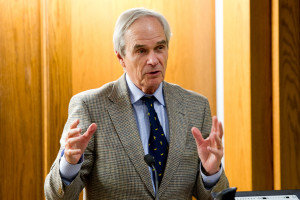
Scholars and government professionals review new book by former Chair of the Administrative Conference of the United States.
Candidates for political office have often declared that their aim is to “run government like a business.” This trend goes back at least to the early 1990s, when Ross Perot committed to improving government efficiency by deploying private-sector management principles. During his recent campaign in the Republican presidential primary, candidate Ben Carson declared that he would “change the government into something that looks more like a well-run business than a behemoth of inefficiency.” As Secretary of Housing and Urban Development, Carson has reaffirmed that view.
This trend has been prominent at the presidential level as well. President William Clinton and Vice President Al Gore championed a major “reinventing government” initiative in the 1990s, aimed at achieving “smarter government” in part through “importing private sector efficiency techniques to make government more results-oriented and less costly.” President George W. Bush, the first President to have earned a graduate business degree, promoted a Program Assessment Rating Tool to improve government performance. The Obama Administration created the Performance.gov platform to “deliver a more effective, smarter, and leaner government,” while President Donald J. Trump has put his son-in-law Jared Kushner in charge of a new Office of American Innovation.
These efforts aimed at improving government efficiency have taken place against the backdrop of a shift in who implements government programs. Despite a more than four-fold increase in the size of the federal budget from 1960 to the present, the number of federal government employees has remained relatively constant since the Kennedy Administration. Today, many federal programs and services are administered with increasing reliance on private-sector contractors instead of government employees.
In his new book, Valuing Bureaucracy: The Case for Professional Government, Paul R. Verkuil, a Senior Fellow and the former Chairman of the Administrative Conference of the United States (ACUS), raises concerns about this trend and highlights the value of professionalism and expertise within the career civil service. Extending ideas from his earlier book, Outsourcing Sovereignty: Why Privatization of Government Functions Threatens Democracy and What We Can Do about It, and building on his 2015 Regulation Lecture at Penn Law, Verkuil develops a further case against an undue reliance on “contracting out” government services, which he says too often occurs without adequate oversight and accountability. Verkuil advocates “insourcing” jobs back to the federal bureaucracy and reforming the government’s hiring and firing process to make the government better able to recruit and retain talent.
This series in The Regulatory Review begins with an essay by Verkuil that highlights key themes in his book Valuing Bureaucracy. The series then features essays by prominent scholars and government professionals evaluating Verkuil’s claims. Contributors include: John DiIulio of the University of Pennsylvania’s political science department; Elaine Kamarck of the Brookings Institution; Donald F. Kettl of University of Maryland’s School of Public Policy; David E. Lewis, chair of Vanderbilt University’s political science department; Shelley H. Metzenbaum, Senior Fellow and former president of the Volcker Alliance; Richard J. Pierce, Jr. of the George Washington University Law School; and Matthew Lee Wiener, Vice Chairman and Executive Director of the ACUS. The series concludes with a response essay by Verkuil.
Why Government Professionals Matter
December 4, 2017 | Paul R. Verkuil, Administrative Conference of the United States
Career officials—the indispensable professionals on which government vitally depends—are being discouraged, ignored, or even displaced. In their stead, federal agencies are relying on a private contractor regime that far outstrips members of the civil service in numbers and, increasingly, in influence. We are seeing core officials lose control, at all levels, of the system that administers public policies and delivers government services.
“Deep State” Claims and Professional Government
December 5, 2017 | David E. Lewis, Vanderbilt University
The President’s supporters have decried a “deep state” of deeply embedded bureaucrats working actively to thwart the new President’s agenda. Is there such a thing as a deep state? If so, what is its relation to professional government? These are important questions since one of the central questions of democratic governance, as highlighted in Paul R. Verkuil’s book, is how to build and maintain a competent administrative state.
The Growing Gap in the Rule of Law
December 6, 2017 | Donald F. Kettl, University of Maryland
For many government officials, there is a growing gap between the rule of law and the steps required to administer public programs. Paul R. Verkuil’s insightful and fascinating book provides a foundation for exploring why this gap exists. Verkuil is among the very few scholars and public intellectuals to press the importance of the rule of law—and where it falls short in governance.
Valuing Democratic Governance
December 7, 2017 | John J. DiIulio, Jr., University of Pennsylvania
Paul R. Verkuil’s book is a tour de force of historical interpretation and empirical analysis. It is also a civics sermon predicated on and punctuated by the author’s unshakeable faith in American democracy. Of course, government today has morphed into a debt-financed, proxy-administered state in which most voters love their member of Congress but hate Congress, demand more government benefits without more taxes, and divide into polarized partisan and ideological factions. But maybe Verkuil is right to hope.
Of “Workarounds” and Bureaucrats
December 11, 2017 | Matthew Lee Wiener, Administrative Conference of the United States
Paul R. Verkuil has established himself as the most forceful academic critic of the “contracting out” of what he saw as non-delegable governmental functions. His main concern in his new book is with the federal civil service. Problems abound—some of them the result not of the civil service laws themselves, but of the perverse ways those laws have been interpreted and applied by the Office of Personnel Management and their likeminded counterparts in agencies.
Learning from Experience for Better Government
December 12, 2017 | Shelley H. Metzenbaum, The Volcker Alliance
Paul R. Verkuil focuses on the people who work in government in his book. Although I wholly agree with his assertion that government workers are critical to effective, trusted government and that government needs professional employees, I question his diagnoses of why governments have problems delivering on their objectives and their prescriptions for fixing those problems.
Valuing Bureaucracy Is a Quixotic Project
December 13, 2017 | Richard J. Pierce, Jr., The George Washington University Law School
In his new book, Paul R. Verkuil notes that the number of federal civil servants has not increased in decades. All growth in the federal workforce has been through the addition of contractors. Verkuil argues passionately and persuasively that we should change this situation and return to a federal workforce that consists primarily of professional bureaucrats. I agree with Verkuil, but he is waging a quixotic campaign. The changes he urges cannot happen.
Reliance on Contractors is Likely Here to Stay
December 14, 2017 | Elaine C. Kamarck, Brookings Institution
Paul R. Verkuil has written a very important book about a dramatic transformation that has taken place in the federal government. As the number of civil servants has remained constant, the number of government contractors has increased dramatically. What has led to the creation of this so-called fourth branch? The answer lies in a combination of structure and politics.
Valuing Commentary
December 18, 2017 | Paul R. Verkuil, Administrative Conference of the United States
There are signs that suggest civil service reform is on Congress’s mind. But it is doubtful that the current Administration in Washington, D.C. will provide many opportunities for serious reform proposals to emerge. On the contrary, we will have all we can do to keep valuable professionals from being transferred into dead-end assignments or resigning in frustration. Persisting in the face of all this still seems a public service worth rendering, which is a conclusion hopefully all the authors of the commentaries in this series will accede to.



